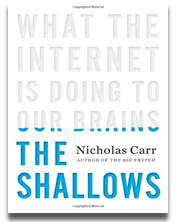Book Review: The Shallows

Carr, Nicholas G. The shallows : what the Internet is doing to our brains. Norton, 2010.
Technology writer Nicholas Carr’s new work is about the effect of the Internet on our brains. Carr argues that the calm, focused minds of book readers are being replaced by a new mind that takes in information in intense disjointed bursts. This new mind of the internet user is easily distracted, and finds it difficult to pay attention and to engage in learning.
For centuries, printed books have been the foundation of our culture. Soon after Gutenberg’s invention made books inexpensive, reading became the primary means of exchanging knowledge and experience. The act of reading a book required sustained attention to a static object. Engaging deeply with written words was not a natural state for human beings and our brains needed years of training to do it effectively. The practice of reading changed the physical structure of our brains, promoting our ability to think deeply and creatively.
Then came the Internet. Carr argues that reading on the internet is different from the reading of printed books. When people use the internet, they read in rapid bursts, sampling bits of information from many sources. Frequent use changes the brain’s neural pathways, compromising the ability to concentrate and to contemplate. People become skilled at skimming. Despite the richness of the information, people remember less. The Internet is hurting our ability to read deeply, to think creatively and to reflect on our experiences.
While Carr does not propose any solutions, there is an obvious one. Daily reading of print books may keep our brains wired for deep thinking. But take care in what you select. Magazines and books have shortened their articles and chapters, offering readers sidebars, cartoons and captions, which mimic the internet. Deep reading of thoughtful texts in a traditional linear style, like The Shallows, may keep our brains in shape.
© Reviewer: Meg Trauner & Ford Library – Fuqua School of Business.
All rights reserved.
Tags: Technology